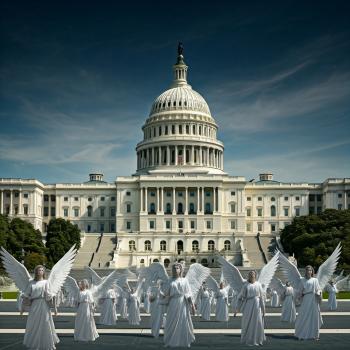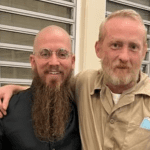The previous post is mostly a joke, and a joke mostly directed at myself.
Re-reading a bit of Brother Lawrence in 25 Books Every Christian Should Read was another reminder that prayers of gratitude or intercession aren’t often my first thoughts or the first words on my lips — particularly when I’m driving. (I do wonder, though, how Brother Lawrence would’ve gone about practicing the presence of God on U.S. 202 during rush hour.)
But apart from the joking absurdity of “prayer macros,” I also think some of our interjections — no matter how profane — sometimes function like a kind of prayer. In the moment, when we’re dazzled or frightened or suddenly moved to compassion, most of us cannot instantly offer a full articulation of our response. Whatever we say in that moment will be inadequate to what we’re feeling or thinking or trying to think.
“Wow” is barely even a word, but I often rely on it to express thoughts or feelings I’m not fully able to process. We all laughed at Double-Rainbow Guy, partly due to his goofily heartfelt joy, but also partly because most of us can’t do much better when we’re awestruck. We babble. We swear. We utter syllables like “Wow” in lieu of the words we’re unable to form.
And the same thing can happen when we’re overwhelmed by compassion or empathy, when we’re outraged by evil or injustice, when we’re delighted or inspired by witnessing an act of courage, heroism or mastery. We don’t know what to say or how to say it, but we speak anyway.
And at some level, those inarticulate words can form a kind of prayer. “Oh, poor bastard …” really can be a kind of shorthand expression of inchoate hopes or wishes or intercessions. Whether such impulses are expressed formally as prayers, or whether we’re even able to express them coherently, I think they can function as a kind of prayer.
I think maybe that’s part of what St. Paul was suggesting when he wrote:
Likewise the Spirit helps us in our weakness; for we do not know how to pray as we ought, but that very Spirit intercedes with sighs too deep for words. And God, who searches the heart, knows what is the mind of the Spirit, because the Spirit intercedes for the saints according to the will of God.
I don’t know whether Herbert Morrison was a religious man — if he believed in one God or no God or 20 Gods. But when I listen to his extraordinary 1937 report from Lakehurst, N.J., I can’t help but hear something like a prayer in his cries of “get out of the way” and “Oh, the humanity.” And I have to think that if there is a God who is anything at all like the God of Abraham, then that God must also have heard those words as a prayer with sighs too deep for words.
For all that, though, the idea of “prayer macros” is still ridiculous, mainly because of the very thing that Tony Jones was getting at in his poll about the purpose of prayer.
We pray for many reasons, but one of the main ones is to change ourselves. Praying the Lord’s Prayer 10 times — practicing that prayer, speaking and thinking those words — could never be replaced by some kind of spiritual Perl script somehow automating the process. Quite apart from how such “prayer macros” might be received by God, they clearly wouldn’t have the same effect on me, on the pray-er.
Here again I’m reminded of big Don Gately and a passage from one of my favorite books, David Foster Wallace’s Infinite Jest. I’m not quite sure if that sprawling, messy, difficult masterpiece belongs in a list of “25 Books Every Christian Should Read,” but the Ennet House sections centered around that macrocephalic ex-burglar taught me more about the church than a dozen other books explicitly written on that subject.
Anyway, via Wallace and Don Gately, here is my answer to Jones’ poll question — “Why do you pray?”
He had nothing in the way of a like God-concept, and at that point maybe even less than nothing in terms of interest in the whole thing; he treated prayer like setting an oven-temp according to a box’s direction. Thinking of it as talking to the ceiling was somehow preferable to imagining talking to Nothing. And he found it embarrassing to get down on his knees in his underwear, and like the other guys in the room he always pretended his sneakers were like way under the bed and he had to stay down there a while to find them and get them out, when he prayed, but he did it, and beseeched the ceiling and thanked the ceiling, and after maybe five months Gately was riding the Greenie at 0430 to go clean human turds out of the Shattuck shower and all of a sudden realized that quite a few days had gone by since he’d even thought about Demerol or Talwin or even weed. Not just merely getting through those last few days — Substances hadn’t even occurred to him. I.e., the Desire and Compulsion had been Removed. More weeks went by, a blur of Commitments and meetings and gasper-smoke and clichés, and he still didn’t feel anything like his old need to get high. He was, in a way, Free. It was the first time he’d been out of this kind of mental cage since he was maybe ten. He couldn’t believe it. He wasn’t Grateful so much as kind of suspicious about it, the Removal. How could some kind of Higher Power he didn’t even believe in magically let him out of the cage when Gately had been a total hypocrite in even asking something he didn’t believe in to let him out of a cage he had like zero hope of ever being let out of? When he could only get himself on his knees for the prayers in the first place by pretending to look for his shoes? He couldn’t for the goddamn life of him understand how this thing worked, this thing that was working. It drove him bats. At about seven months, at the little Sunday Beginners’ Mtg., he actually cracked one of the Provident’s fake-wood tabletops beating his big square head against it.
White Flagger (‘Ferocious’) Francis Gehaney, one of the most ancient and gnarled of the Crocodiles, had a white crew cut and skallycap and suspenders over the flannel shirt that encased his gut, and an enormous cucumber-shaped red schnoz you could actually see whole arteries in the skin of, and brown stumpy teeth and emphysema and a portable little oxygen-tank thing whose blue tube was held under the schnoz with white tape, and the very clear bright eye-whites that went along with the extremely low resting pulse-rate of a guy with geologic amounts of sober AA time. Ferocious Francis G., whose mouth was never without a toothpick and who had on his right forearm a faded martini-glass-and-naked-lady tattoo of Korean-War-vintage, who’d gotten sober under the Nixon administration and who communicated in the obscene but antiquated epigrams the Crocs all used — F.F. had taken Gately out for eye-rattling amounts of coffee, after the incident with the table and the head. He’d listened with the slight boredom of detached Identification to Gately’s complaint that there was no way something he didn’t understand enough to even start to believe in was seriously going to be interested in helping save his ass, even if He/She/It did in some sense exist. Gately still doesn’t know why it helped, but somehow it helped when Ferocious Francis suggested that maybe anything minor-league enough for Don Gately to understand probably wasn’t going to be major-league enough to save Gately’s addled ass from the well-dressed Sergeant at Arms, now, was it?
That was months ago. Gately usually no longer much cares whether he understands or not. He does the knee-and-ceiling thing twice a day, and cleans shit, and listens to dreams, and stays Active, and tells the truth to the Ennet House residents, and tries to help a couple of them if they approach him wanting help.
















